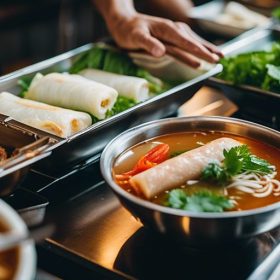In recent years, there has been a noticeable trend of expats starting food businesses in Vietnam. This growing trend can be attributed to several factors, including the country’s vibrant food culture, affordable cost of living, and the increasing number of tourists and expats in Vietnam. Expats are drawn to Vietnam’s food industry because of the opportunity to explore and contribute to the diverse culinary landscape of the country.
Vietnam’s food industry is attractive to expats for several reasons. Firstly, Vietnamese cuisine is renowned for its bold flavors and fresh ingredients, making it a popular choice among locals and tourists alike. The country’s street food culture is particularly appealing, with bustling markets and food stalls offering a wide variety of dishes at affordable prices. Additionally, Vietnam’s growing middle class has led to an increase in disposable income and a greater demand for dining out, creating a favorable environment for food businesses to thrive.
The challenges of starting a food business in Vietnam as an expat
While starting a food business in Vietnam can be an exciting venture, it also comes with its fair share of challenges for expats. One of the main challenges is the language barrier and cultural differences. Vietnamese is a tonal language that can be difficult for foreigners to learn, which can make communication with suppliers, staff, and customers challenging. Additionally, cultural differences in business practices and etiquette may require expat entrepreneurs to adapt their approach to suit the local market.
Another challenge faced by expat entrepreneurs is limited access to capital and resources. Starting a business requires financial investment, and expats may find it difficult to secure funding from local banks or investors due to their foreign status. Additionally, finding reliable suppliers and accessing quality ingredients can be a challenge for expats who are unfamiliar with the local market.
The complex legal and regulatory environment in Vietnam is another hurdle that expat entrepreneurs must navigate. Obtaining the necessary licenses and permits can be a time-consuming and bureaucratic process, requiring a good understanding of the local regulations. Failure to comply with these regulations can result in fines or even legal issues, making it crucial for expat entrepreneurs to seek legal advice and ensure they are operating within the law.
Finding the right niche: Identifying gaps in the local food market
To succeed in Vietnam’s competitive food industry, expat entrepreneurs must identify gaps in the local food market and develop a unique concept that fills those gaps. This requires thorough research of the local food scene and an understanding of the preferences and tastes of both locals and expats.
Researching the local food scene involves exploring different neighborhoods, visiting markets and restaurants, and talking to locals to get a sense of what is currently available. By identifying areas where there is a lack of options or untapped potential, expat entrepreneurs can develop a concept that meets the needs of the market.
Developing a unique concept involves creating a menu or food offering that sets your business apart from competitors. This could involve incorporating international flavors or techniques into traditional Vietnamese dishes, or introducing a completely new cuisine to the market. By offering something different and appealing to both locals and expats, expat entrepreneurs can carve out a niche for themselves in Vietnam’s food industry.
Starting a food business in Vietnam requires obtaining several licenses and permits to ensure compliance with local regulations. These include business registration, food safety certification, fire safety certification, and alcohol licensing if applicable.
To obtain these licenses and permits, expat entrepreneurs should seek legal advice from professionals who are familiar with the local regulations. They should also ensure that their premises meet all safety requirements and that their staff are trained in food handling and hygiene practices.
It is important for expat entrepreneurs to comply with these regulations to avoid fines or legal issues that could jeopardize their business. By taking the time to understand and navigate the legal and regulatory environment, expat entrepreneurs can ensure that their business operates within the law and maintains a good reputation.
Building a brand: Creating a unique identity for your food business
In Vietnam’s competitive food industry, building a strong brand is essential for success. A strong brand identity helps differentiate your business from competitors and attracts customers. It also helps build trust and loyalty among customers, who are more likely to return to a business they identify with.
Creating a unique brand identity involves several elements, including the name, logo, colors, and overall aesthetic of the business. These elements should reflect the concept and values of the business and resonate with the target audience. For expat entrepreneurs, it is important to strike a balance between appealing to both locals and expats, as both groups contribute to the success of the business.
Examples of successful food brands in Vietnam include Banh Mi Phuong in Hoi An, which gained international recognition after being featured on Anthony Bourdain’s television show, and The Lunch Lady in Ho Chi Minh City, known for its authentic Vietnamese dishes and warm hospitality. These businesses have successfully created a unique brand identity that resonates with both locals and tourists.
Sourcing ingredients: Finding reliable suppliers in Vietnam
Sourcing quality ingredients is crucial for any food business, and expat entrepreneurs in Vietnam must find reliable suppliers to ensure the consistency and quality of their dishes. The local food supply chain in Vietnam can be complex, with many small-scale producers and markets scattered throughout the country.
To find reliable suppliers, expat entrepreneurs should start by visiting local markets and building relationships with vendors. This allows them to see firsthand the quality of the ingredients and negotiate prices directly with suppliers. It is also important to conduct regular quality checks to ensure that suppliers are meeting the required standards.
Building relationships with suppliers is key to maintaining a steady supply of ingredients. By establishing trust and loyalty, expat entrepreneurs can secure consistent and reliable sources of ingredients, which is essential for the success of their business.
Creating a menu that appeals to both locals and expats is crucial for the success of a food business in Vietnam. While expat entrepreneurs may be tempted to cater solely to the tastes of their fellow expats, it is important to also consider the preferences of the local population, who make up the majority of customers.
To create a menu that appeals to both groups, expat entrepreneurs should strike a balance between familiar flavors and new experiences. This could involve incorporating international ingredients or techniques into traditional Vietnamese dishes, or introducing new dishes that are inspired by international cuisines.
Examples of successful menus in Vietnam include The Workshop in Ho Chi Minh City, which offers a fusion of Vietnamese and international flavors, and Cuc Gach Quan in Hanoi, which specializes in traditional Vietnamese dishes made with organic ingredients. These businesses have successfully created menus that cater to both locals and expats, attracting a diverse customer base.
Finding the right location: Balancing affordability and visibility
Finding the right location is crucial for the success of a food business in Vietnam. The location should strike a balance between affordability and visibility, as well as accessibility for both locals and tourists.
Affordability is important because it affects the overall cost of running the business. Expensive rent or overhead costs can eat into profits and make it difficult for the business to remain sustainable. However, visibility is also important because it determines how easily customers can find and access the business.
To find the right location, expat entrepreneurs should consider factors such as foot traffic, proximity to tourist attractions or residential areas, and competition in the area. It is also important to negotiate favorable lease terms and ensure that the premises meet all safety and hygiene requirements.
Examples of successful locations in Vietnam include the Old Quarter in Hanoi, which attracts a high volume of tourists and has a vibrant food scene, and the backpacker area in Ho Chi Minh City, which is popular among expats and tourists. These locations offer a good balance between affordability and visibility, making them attractive options for expat entrepreneurs.
Marketing plays a crucial role in the success of a food business in Vietnam. Expats entrepreneurs can leverage social media and word-of-mouth to promote their business and attract customers.
Social media platforms such as Facebook, Instagram, and YouTube are popular among both locals and expats in Vietnam. Expats entrepreneurs can create engaging content that showcases their dishes, highlights their unique concept, and tells the story behind their business. They can also collaborate with influencers or bloggers who have a large following to reach a wider audience.
Word-of-mouth is also powerful in Vietnam, where people rely heavily on recommendations from friends and family. By providing excellent customer service and creating memorable dining experiences, expat entrepreneurs can encourage customers to spread the word about their business.
Examples of successful marketing strategies in Vietnam include The Daun Restaurant in Hoi An, which gained popularity through its visually appealing Instagram posts, and The Secret Garden in Ho Chi Minh City, which relies on word-of-mouth recommendations from satisfied customers.
Building a loyal customer base: Providing excellent customer service
Providing excellent customer service is crucial for building a loyal customer base in Vietnam’s food industry. Customers value friendly and attentive staff, prompt service, and a welcoming atmosphere.
To provide excellent customer service, expat entrepreneurs should invest in staff training to ensure that employees are knowledgeable about the menu, attentive to customer needs, and able to handle any issues that may arise. They should also create a warm and inviting atmosphere that makes customers feel comfortable and valued.
Examples of businesses with loyal customer bases in Vietnam include The Pizza Company, which is known for its friendly and efficient service, and Highlands Coffee, which has built a strong brand based on its commitment to quality and customer satisfaction.
The rewards of entrepreneurship in Vietnam’s dynamic food industry
Starting a food business in Vietnam as an expat comes with its fair share of challenges, but the rewards can be great. The country’s vibrant food culture, affordable cost of living, and growing middle class make it an attractive destination for expat entrepreneurs looking to explore and contribute to the diverse culinary landscape.
By identifying gaps in the local food market, navigating the legal and regulatory environment, building a strong brand, sourcing quality ingredients, creating a menu that appeals to both locals and expats, finding the right location, marketing their business effectively, and providing excellent customer service, expat entrepreneurs can succeed in Vietnam’s dynamic food industry.
While there are challenges along the way, the opportunity to share their passion for food with a diverse customer base and contribute to Vietnam’s culinary scene makes the journey worthwhile. With careful planning, perseverance, and a commitment to excellence, aspiring expat entrepreneurs can pursue their dreams in Vietnam’s food industry and reap the rewards of entrepreneurship.

Cuong Nguyen is a talented writer and experienced waitress at Vietnampalace.net, a renowned Vietnamese restaurant that offers an extensive menu of authentic Vietnamese cuisine. With a background in the competition of Vietnamese cuisine, Cuong brings a wealth of knowledge and expertise to the dining experience. From delicious pho dishes to fresh spring rolls, Cuong ensures that every meal is made with the freshest ingredients and authentic flavors.With exceptional service and a friendly atmosphere, Cuong takes pride in providing a memorable dining experience for every customer.
Whether you’re a vegetarian looking for options or a meat lover craving the flavors of traditional Vietnamese dishes, Cuong guarantees a delightful culinary adventure. So, visit Vietnampalace.net and let Cuong guide you through the tantalizing world of Vietnamese cuisine.



